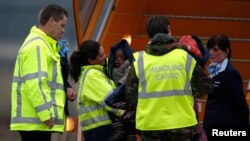International adoptions are under scrutiny after the Netherlands halted them because of an inquiry that revealed serious misconduct. In cases going back decades, fraud, corruption and trafficking played a role in many adoptions. Now other European countries are opening investigations.
Adoptees and rights organizations in other western European countries are taking action in the wake of the Dutch investigation. Belgium is expecting the outcome of an adoption probe later this year. The social affairs minister in Sweden announced an investigation into adoption practices dating back to the 1960s.
Roelie Post says she is not surprised by the assessments in the Dutch report. Post is a former European Union civil servant who became a whistleblower after flagging the issue of illegal adoptions and child trafficking from eastern Europe more than 20 years ago. Post says she thinks the adoption system cannot go forward in its current form.
“After these 60 years there is no future, not the way it was," she said. "Perhaps a small number of individual cases, but not an organized market where you have programs and contracts and, private adoption agencies. I think that will become a thing of the past.”
Marcia Engel is a Dutch adoptee from Colombia. Engel says that when she started the search for her biological family, she realized her mother had been forced to give her up.
“In my own case, but also with a lot of adoptees, they were just made on paper an orphan, but in reality, they had family that would like to take care of them,” she said.
Engel set up the organization Plan Angel in 2008 to help connect adoptees to their birth families. The organization has engaged with more than 500 cases involving Colombian adoptees.
Engel and her organization are helping people adopted by families from North America and western Europe as well as domestically. Engel says she sees persistent misconduct not only with Dutch adoption cases, but with all countries.
Engel says she hopes the attention on the subject will help people understand the true nature of many international adoptions.
“The general thought about international adoption is that it's a very good thing to help poor children from abroad to give them a better chance in life. And, I think it's also important that people are changing a little bit the narrative about what they think about international adoption, because there is a dark side. And the dark side is that many biological families did not voluntarily give up their babies or children,” she said.
While this isn’t the first time a report has outlined illegal practices within international adoptions, it is the first time a European country is halting such procedures until reforms are made. While the Dutch inquiry focused on Bangladesh, Brazil, Colombia, Indonesia and Sri Lanka, adoptions from other countries have been halted for now.
Countries popular with Western parents for adopting children have been tightening restrictions over the years. Ethiopia banned all foreign adoptions in 2018 following abuse cases reported in the United States. Other countries include Cambodia, Guatemala and Russia.




